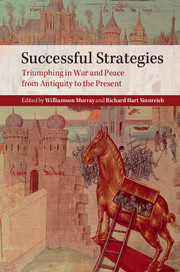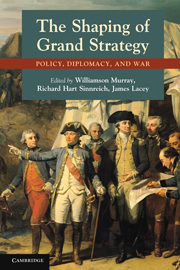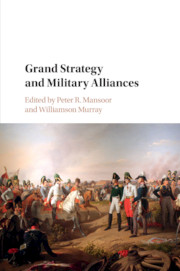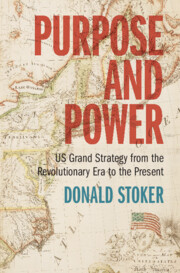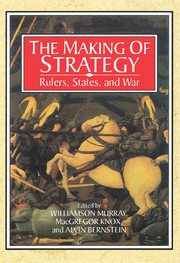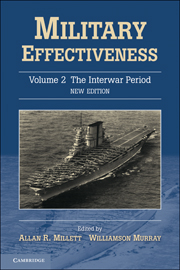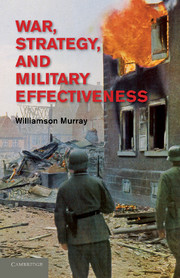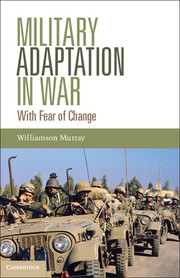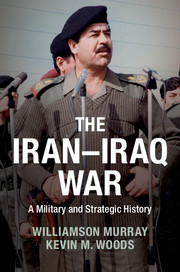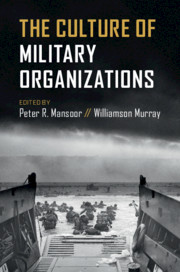Successful Strategies
Triumphing in War and Peace from Antiquity to the Present
- Editors:
- Williamson Murray, Ohio State University
- Richard Hart Sinnreich
- Date Published: May 2014
- availability: Available
- format: Paperback
- isbn: 9781107633599
Paperback
Other available formats:
Hardback, eBook
Looking for an inspection copy?
This title is not currently available for inspection. However, if you are interested in the title for your course we can consider offering an inspection copy. To register your interest please contact [email protected] providing details of the course you are teaching.
-
Successful Strategies is a fascinating new study of the key factors that have contributed to the development and execution of successful strategies throughout history. With a team of leading historians, Williamson Murray and Richard Hart Sinnreich examine how, and to what effect states, individuals and military organizations have found a solution to complex and seemingly insoluble strategic problems to reach success. Bringing together grand, political and military strategy, the book features thirteen essays which each explores a unique case or aspect of strategy. The focus ranges from individuals such as Themistocles, Bismarck and Roosevelt to organizations and bureaucratic responses. Whether discussing grand strategy in peacetime or that of war or politics, these case studies are unified by their common goal of identifying in each case the key factors that contributed to success as well as providing insights essential to any understanding of the strategic challenges of the future.
Read more- Reveals the key factors that have contributed to the development and execution of successful strategies throughout history
- Comprehensive in approach including political, grand and military strategy and featuring a broad range of case studies from ancient Greece to the end of the Cold War
- Lessons of the past can inform how we understand and confront the strategic challenges of the future
Customer reviews
17th Oct 2024 by UName-144117
Much has been written about strategy in the past three decades, whether it be concerned with military strategy, grand strategy, the theory of strategy, or the plethora of books advising on various forms of business strategy. Most present a rather simplistic approach, as if the key elements of a successful strategy can be per-ordained or the strategy of a successful general can be readily applied to other situations - what some call the template approach. Strategy, however, is a far more complex issue with a myriad of inputs and difficulties, as Williamson Murray demonstrated in the excellent study The Making of Strategy twenty years ago. In Successful Strategies he and Richard Hart Sinnreich have drawn together a fine group of academic historians to present a range of studies on approaches that have delivered results over several millennia, again highlighting how complex the formulation and execution of strategy is, and that perfect results are not always possible. This book is really concerned with grand strategy - the level at which governments and countries operate. In thirteen excellent essays the contributors cover a broad canvas stretching from the ancient Athens of Themistocles to the Cold War of the late 20th Century. Some cover familiar ground such as the strategy of Lincoln and Grant during the American Civil War, Bismarck’s strategy to unify the German States into a united Germany under Prussian control, and US grand strategy during the Second World War. Clifford J Rogers addresses a much less known example, presenting a fascinating study of the conquest of Wales by Edward I, employing the advice of Gerald of Wales written 82 years previously, while James Laceys “The grand strategy of the Roman Empire” covers disputed ground among Roman historians. Thomas G Mahnken’s “The Reagan administration’s strategy towards the Soviet Union ‘ supports John L. Gaddis’s comment that President Ronald Reagan was one of the sharpest grand strategists ever, which some readers may find surprising. Murray provides a fine Introduction and Sinnreich a concluding Afterword which national leaders would do well to read to top and tail the essays. This is not a book for general public, but is certainly one for those who are interested in strategy, or are students of war and politics, and should be on the reading lists of courses addressing these subjects. Each essay presents the complex nature of the subject, the myriad of factors that influence grand strategy makers for good or for worse, and provides sound advice on the elements that influence the formulation and execution of a successful strategy. However, the examples show that each country and its geography, together with contemporary situations and influences, ensures that a particular strategy is a child of its own time, and that the execution of successful strategies is a difficult but not impossible task. There are no quick fix solutions, as is often touted by self serving political leaders, but as Williamson Murray notes the serious study of history offers clear pointers to good and bad choices, and that “Beyond several decades, it is almost impossible for statesmen and military leaders to plan, and those who [do] ... disregard the complexities that human interactions inevitably involve.” If there is a common thread to strategic success the cases in this book “suggest that, at least in the short run, strategy more reliably - or at least, more recognizably - governs behaviour when authority over its formulation and execution resides in a single dominant decision maker. “
Review was not posted due to profanity
×Product details
- Date Published: May 2014
- format: Paperback
- isbn: 9781107633599
- length: 475 pages
- dimensions: 227 x 151 x 25 mm
- weight: 0.67kg
- contains: 1 map 2 tables
- availability: Available
Table of Contents
Introduction Williamson Murray
1. The strategic thought of Themistocles Victor Davis Hanson
2. The grand strategy of the Roman Empire James Lacey
3. Giraldus Cembrensis, Edward I, and the conquest of Wales Clifford J. Rogers
4. Creating the British way of war: English strategy in the War of the Spanish Succession Jamel Otswald
5. Failed, broken, or galvanized? Prussia and 1806 Dennis Showalter
6. Victory by trial and error: Britain's struggle against Napoleon Richard Hart Sinnreich
7. The strategy of Lincoln and Grant Wayne Hsieh
8. Bismarckian strategic policy, 1871–90 Marcus Jones
9. Dowding and the British strategy of air defense, 1936–40 Colin Gray
10. US naval strategy and Japan Williamson Murray
11. US grand strategy in World War II Peter R. Mansoor
12. American grand strategy and the unfolding of the Cold War, 1945–61 Bradford A. Lee
13. The Reagan Administration's strategy toward the Soviet Union Thomas G. Mahnken
Afterword Richard Hart Sinnreich.
Sorry, this resource is locked
Please register or sign in to request access. If you are having problems accessing these resources please email [email protected]
Register Sign in» Proceed
You are now leaving the Cambridge University Press website. Your eBook purchase and download will be completed by our partner www.ebooks.com. Please see the permission section of the www.ebooks.com catalogue page for details of the print & copy limits on our eBooks.
Continue ×Are you sure you want to delete your account?
This cannot be undone.
Thank you for your feedback which will help us improve our service.
If you requested a response, we will make sure to get back to you shortly.
×
